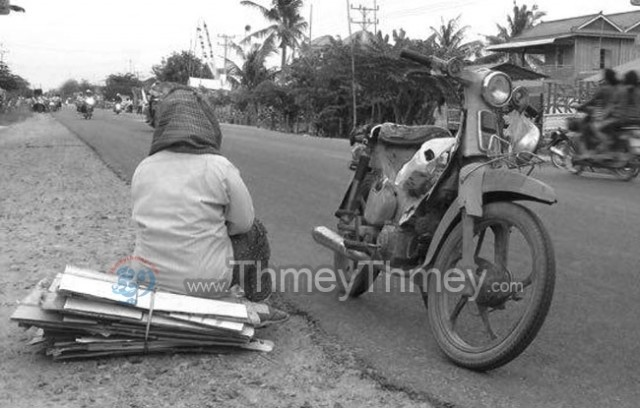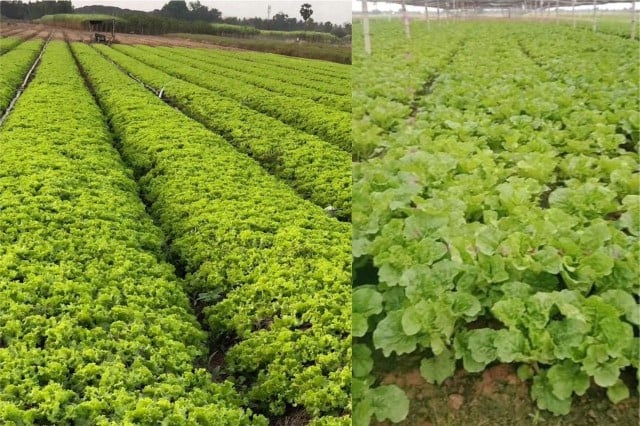Poverty: the Government or People’s Fault?

- Lim Tola
- March 3, 2020 2:25 AM
In 1994, according to the rate of the poverty in the Kingdom of Cambodia, 47 per cent of the population was constantly living under the poverty line. Fast forward to the year 2018, this previous statistic has been reduced to 13.5 per cent. This is an indication that a number of Cambodians have escaped poverty. And yet, some still remain imprisoned within the margin, struggling to break free. When people of a nation are living under the poverty line, should it be the fault of the government for not taking the matter in hand in a responsive manner or is it the fault of the people themselves due to their “laziness?”
In the United States, Japan, China or France, poverty is a reality that will always exist in society, and this in spite of the fact that these countries have been highly developed for centuries.
Beggars, houseless and jobless people still wander around in these magnificent and prosperous nations. What may differ in the context of poverty between Cambodia and those developed nations is that, even though poverty is almost impossible to completely eliminate, the poverty rates in those developed countries are remarkably lower than the poverty rate in Cambodia. Speaking of which, people living in poverty in developed countries still somehow experience better basic living conditions than those that Cambodians under the poverty line are experiencing.
Let’s focus on the situation in Cambodia. Statistics for 1994 indicated that 47 percent of the population was living under the poverty line. And yet, more than two decades later, in 2018, the percentage of people who lived under the poverty line had dropped to 13.5 per cent. This means that a large number of people have successfully broken loose from the grips of poverty. This drop in number can be attributed in part to the action as well as the intervention of the government body, civil society, the private sector and, at the same time, the effort that people put into improving their situation. By definition, a person who earns less than $1 per day is considered to live under the poverty line.
Regarding people who find themselves under the poverty line, could it be due to mistakes or mismanagement on the part of the government? Or is it the result of laziness, the mindset of not wanting to improve one’s situation mainly among ordinary people?
Before drawing conclusions, a number of issues must be addressed as to why and how poverty occurs in the first place. Studies and researches show that some Cambodians became stuck in the limbo of poverty due to a number of internal and external causes. Those commonly seen are: 1. chronic illness or diseases of family member(s); 2. the limited size of productive agricultural land, which yields less than is needed to feed a large family; 3. accumulation of debts; 4. natural disasters that occur on a regular basis; 5. a lack of appropriate basic education; 6. limited job opportunities; and 7. corruption.
By setting those reasons as basis for discussion and analysis, it is possible to put some blame on the inner workings of the government. The role of the government is not that different from parenting, but just on a nation-wide scale. In a situation in which the government is incapable to produce more job opportunities for people, then it is a flaw in government. If many over-sized families still have a hard time economically with their limited agricultural land, part of this problem can be associated with the government as well since the government should be coming up with and implementing effective policies to address the issue.
Beside this, the inaccessibility of proper public education for people can be a major issue for the government. For the purpose of clarification, a family, a community or even a nation that has poor education will experience a much harder time competing with others and getting up to modern standard. Education is key to reducing the poverty rate regardless of the scale of a family, community or nation.
Income and other basic human necessities such as nutritious food and proper clothing are borne with hard work. However, it is common sense that well-educated individuals will be more likely to yield more productivity than their less educated counterparts. Education is a catalyst that helps propel a nation out of the poverty sinkhole at a more accelerated pace.
Among the many investments out there, education is an aspect of society that needs to be invested into long term. However, the result from that investment must be seen as a long-term one that may only materialize in the far future. As part of parenting, investing in educating one’s children for well over 22 years until their graduation day is not a simple commitment. Yet, this investment will benefit those children for the rest of their lives as well as their own children in decades to come.
Several other factors—or mistakes—that the government has not fully manage to address is the availability of public services. Furthermore, a certain number of government officials are still involved in corruption, which hurts the population. On the other side of the argument, the judicial system in Cambodia does not yet offer fair justice between the rich and the poor. Regarding education, the more fortunate families will send their children to private schools that offer teaching of relatively high standard. Meanwhile, the less fortunate families, with their few options, will be forced to send their children to lower-standard public schools.
Based on what have been mentioned so far, the blame can partially be attributed to the government as part of management to address poverty in Cambodia.
When a great many people in a nation live under the poverty line, the blame must be put on the government, since the government’s main responsibility is steering the nation’s fate. With all these bad emotions toward the effectiveness of the governing body, are there any mistakes or flaws of the people themselves that should also be pointed out?
In general terms, managing a nation requires enormous work on the part of all parties involved. These building blocks of a nation are the government, the private sector, civil society and citizens. Once again, blaming the government is not entirely wrong. But by digging deeper into the argument, the people themselves should somehow also be blamed for their mistakes and mismanagement.
Not so long ago, the Khmer were criticized as being a race that lacked vision, whose people had little vigor or career ambition, plus a tendency to enjoy leisure more than work—maybe due in part to the fact that Cambodia had always provided people with rich natural resources. This reputation for lack of ambition was developed while France was managing Cambodia as part of Indochina: its colonial empire that consisted of Cambodia, Laos and Vietnam. There was a saying among some French colonists: “The Vietnamese go directly to plant the rice. The Cambodians walk to the field to observe the rice growing. The Laotians relax and listen to the breeze hitting the rice fields. The Chinese harvest the crop and sell it for money.”
Based on this French colonists’ saying, each nationality had its own distinctive behavior, that is, the Vietnamese are highly motivated to work, the Cambodians love leisure time, the Laotians can be a bit lazy, and the Chinese are born to trade.
Obviously, goods don’t exist unless they are made by human beings. Things like computers, clothes, tables, chairs and so on are products shaped by human minds and made by human hands. What if people are not motivated, or in other words “too lazy to produce,” money will not fall from the sky. Work produces products, products lead to sales, which later generate money and, ultimately, money brings upon wealth.
Let’s take a glimpse at some of the Cambodian people. Have they done their best to improve their livelihood?
In some rural areas of the country, a number of women can be seen sitting in the comfort of their wooden houses, chatting, playing card games, gambling, and sometimes picking up lice from each other’s hair. Usually, these unproductive activities fill the entire morning of their day. Does this daily routine earn them money? Some men consume alcohol from dawn to dusk. Again, what do they produce? Others spend half of their afternoons napping. Is this not a waste of time, which could be used for something more productive?
Some families have fertile land waiting to be cultivated. Still, they will not farm the land and instead buy produce from others for consumption. They choose not to raise cattle for meat or revenues. If those families had the will to simply raise 10 chickens, five ducks, a couple of pigs and cows, those families would undoubtedly earn a decent revenue to add to their income.
To conclude this discussion with all the issues that were raised, we come to the conclusion that a person cannot escape from the dark and deadly poverty sinkhole if that person is not more mindful and make the effort to be more productive and efficient.
The government does its part. But it cannot handle what must be done by people themselves. “God helps only those who help themselves,” as the saying goes. And “laziness leads to poverty.”















